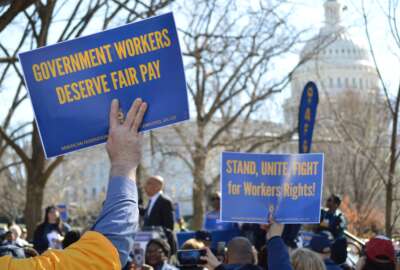Pardon me if I chuckle at a sign which read, “STAND, UNITE, FIGHT for Workers Rights!” Someone clutched it overhead while attending the American Federation of Government Employees rally the other day. Held near the Capitol, the rally supported a bill that could give federal employees an 8.7% raise.
The rally prompted a few philosophic thoughts on the federal employee environment.
I don’t think of federal employees as “workers,” but rather as people who chose public service with the understanding that neither the best nor the worst of private sector employment practices and benefits happen in the federal government. I avoid the word “worker” in general when referring to people who work for a living. “Worker” evokes bees, ants or Chairman Mao subjects — undifferentiated creatures with no agency, no choice over what they do in life. Drone, drudge, prole, laborer, peon — such descriptors equally apply to those without much choice.
But federal employees? Nah, hardly drones. The AFGE is not called the American Federation of Government Workers. You can bargain over staffing levels and working patterns. Federal employees are protected by specific statutes and regulations, receive a defined benefit pension backed by the faith of the U.S. government, and, in most instances, have a good deal of career mobility. Read about, say, coal mining a century ago as a reality check to balance the sense of oppression perhaps some of the rally attendees might have felt.
More importantly, the work matters.
Hey, I’m a salary guy myself. A recurring thought a couple of Sundays ago, when, like millions, I indulged that U.S. opiate for the masses, namely the Super Bowl game. I thought, here’s an event orchestrated by an organization that pays its commissioner $50 million a year. He adjudicates among 30 billionaires, each of whom manages multi-million dollar annual cash flows from television advertising peddling everything from chicken wings to SUVs, to say nothing of teams’ multi-channel sales of tickets and $150 lettered jerseys. Yes, players are highly compensated, but their average career lasts three years and they have a 100% injury rate.
Not that the federal working life is all moonlight-and-roses. How agency executives negotiate union agreements, how they train and develop people, how they respond to behaviors such as discrimination or harassment — it varies in a world full of human imperfection. Agencies routinely drag negotiations out for years. In a workforce of 2 million, bad apples occasionally move up the tree.
So, yes, feds have lots of legitimate concerns. Many feel the pinch from the inflation we’ve had. Congressional members at the rally said that 8.7% raise wouldn’t be a raise at all, when factoring in inflation; a fair point. The Thrift Savings Plan website is a horror. People who can are used to teleworking, and they don’t want it yanked away. The Schedule F idea always looms, which would make senior executives more subject to political whim. The federal workforce often gets dumped on unfairly as “unelected bureaucrats.”
Surveys consistently show control over one’s environment and the sense that your work has meaning contribute a lot to job satisfaction. So do the people around you, both colleagues and supervisors. The commute ranks high, as evidenced in a Statista survey, which partly explains the popularity of telework.
At the AFGE rally, a senator shouted, “When we organize, we win!” I would say to Sen. Cory Booker (D-N.J.) , that’s not a universal sentiment, not even among government employees. Booker added, “For the government workers that do some of the most essential jobs, from inspecting our agricultural products, to keeping us safe on our airlines — government workers must have 8.7%.” What federal employees must have is a wage commensurate with their skills, experience and contributions.
More difficult is knowing what the right absolute salary is for a given federal job. It ought to be comparable with comparable jobs in the private sector. But what the heck is that? Every job exists in a market. Brad Pitt and I belong to the same union. Forbes says he earned $100 million last year. I did not. Kidding aside, I always think of a $150k federal staff prosecutor arguing against $1,000 per hour criminal defense lawyer with diamond pinkie rings. Same work, wildly differing pay.
On the organizing front, federal employees have the statutory right to organize. It’s their choice. As long as that’s the case, agency senior management, political appointees and elected officials best serve federal employees and the public when they create conditions in which people can choose fairly, favoring neither unions nor management. People should neither be assumed to desire organizing nor impeded from organizing if that’s their wish.
Feel free to email me your thoughts about your pay, sense of pay equity. I read it all.
Copyright
© 2024 Federal News Network. All rights reserved. This website is not intended for users located within the European Economic Area.
